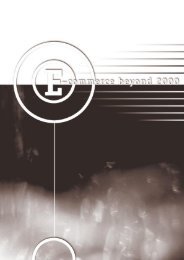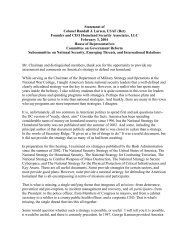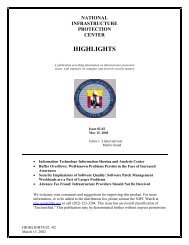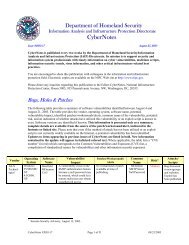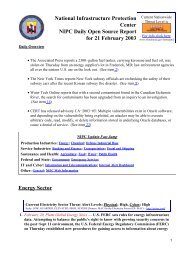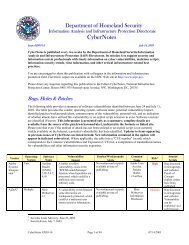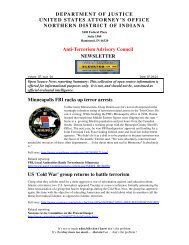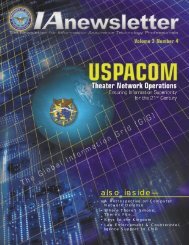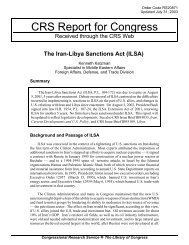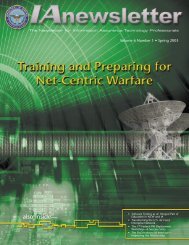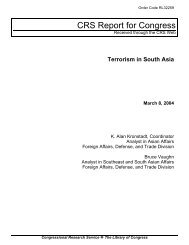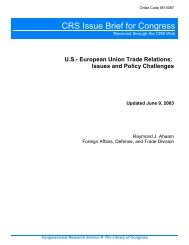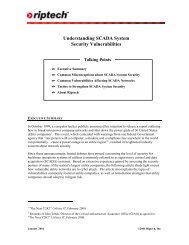- Page 1 and 2:
Bundesamt für Sicherheit in der In
- Page 3 and 4:
IT Baseline Protection of Generic C
- Page 5 and 6:
IT Baseline Protection of Generic C
- Page 7 and 8:
IT Baseline Protection of Generic C
- Page 9 and 10:
IT Baseline Protection of Generic C
- Page 11 and 12:
IT Baseline Protection of Generic C
- Page 13 and 14:
IT Baseline Protection of Generic C
- Page 15 and 16:
IT Baseline Protection of Generic C
- Page 17 and 18:
IT Baseline Protection of Generic C
- Page 19 and 20:
IT Baseline Protection of Generic C
- Page 21 and 22:
IT Baseline Protection of Generic C
- Page 23 and 24:
IT Baseline Protection of Generic C
- Page 25 and 26:
IT Baseline Protection of Generic C
- Page 27 and 28:
IT Baseline Protection of Generic C
- Page 29 and 30:
IT Baseline Protection of Generic C
- Page 31 and 32:
IT Baseline Protection of Generic C
- Page 33 and 34:
IT Baseline Protection of Generic C
- Page 35 and 36:
IT Baseline Protection of Generic C
- Page 37 and 38:
IT Baseline Protection of Generic C
- Page 39 and 40:
IT Baseline Protection of Generic C
- Page 41 and 42:
IT Baseline Protection of Generic C
- Page 43 and 44:
IT Baseline Protection of Generic C
- Page 45 and 46:
IT Baseline Protection of Generic C
- Page 47 and 48:
IT Baseline Protection of Generic C
- Page 49 and 50:
IT Baseline Protection of Generic C
- Page 51 and 52:
IT Baseline Protection of Generic C
- Page 53 and 54:
IT Baseline Protection of Generic C
- Page 55 and 56:
IT Baseline Protection of Generic C
- Page 57 and 58:
IT Baseline Protection of Generic C
- Page 59 and 60:
IT Baseline Protection of Generic C
- Page 61 and 62:
IT Baseline Protection of Generic C
- Page 63 and 64:
IT Baseline Protection of Generic C
- Page 65 and 66:
IT Baseline Protection of Generic C
- Page 67 and 68:
IT Baseline Protection of Generic C
- Page 69 and 70:
IT Baseline Protection of Generic C
- Page 71 and 72:
IT Baseline Protection of Generic C
- Page 73 and 74:
IT Baseline Protection of Generic C
- Page 75 and 76:
IT Baseline Protection of Generic C
- Page 77 and 78:
IT Baseline Protection of Generic C
- Page 79 and 80:
IT Baseline Protection of Generic C
- Page 81 and 82:
IT Baseline Protection of Generic C
- Page 83 and 84:
IT Baseline Protection of Generic C
- Page 85 and 86:
IT Baseline Protection of Generic C
- Page 87 and 88:
IT Baseline Protection of Generic C
- Page 89 and 90:
IT Baseline Protection of Generic C
- Page 91 and 92:
IT Baseline Protection of Generic C
- Page 93 and 94:
IT Baseline Protection of Generic C
- Page 95 and 96:
IT Baseline Protection of Generic C
- Page 97 and 98:
IT Baseline Protection of Generic C
- Page 99 and 100:
IT Baseline Protection of Generic C
- Page 101 and 102:
IT Baseline Protection of Generic C
- Page 103 and 104:
IT Baseline Protection of Generic C
- Page 105 and 106:
IT Baseline Protection of Generic C
- Page 107 and 108:
IT Baseline Protection in the Area
- Page 109 and 110:
IT Baseline Protection in the Area
- Page 111 and 112:
IT Baseline Protection in the Area
- Page 113 and 114:
IT Baseline Protection in the Area
- Page 115 and 116:
IT Baseline Protection in the Area
- Page 117 and 118:
IT Baseline Protection in the Area
- Page 119 and 120:
IT Baseline Protection in the Area
- Page 121 and 122:
IT Baseline Protection in the Area
- Page 123 and 124:
IT Baseline Protection in the Area
- Page 125 and 126:
Non-Networked Systems and Clients _
- Page 127 and 128:
Non-Networked Systems and Clients _
- Page 129 and 130:
Non-Networked Systems and Clients _
- Page 131 and 132:
Non-Networked Systems and Clients I
- Page 133 and 134:
Non-Networked Systems and Clients I
- Page 135 and 136:
Non-Networked Systems and Clients I
- Page 137 and 138:
Non-Networked Systems and Clients I
- Page 139 and 140:
Non-Networked Systems and Clients I
- Page 141 and 142:
Non-Networked Systems and Clients I
- Page 143 and 144:
Non-Networked Systems and Clients I
- Page 145 and 146:
Non-Networked Systems and Clients I
- Page 147 and 148:
Non-Networked Systems and Clients I
- Page 149 and 150:
Networked Systems IT-Security Manag
- Page 151 and 152:
Networked Systems IT-Security Manag
- Page 153 and 154:
Networked Systems IT-Security Manag
- Page 155 and 156:
Networked Systems IT-Security Manag
- Page 157 and 158:
Networked Systems IT-Security Manag
- Page 159 and 160:
Networked Systems IT-Security Manag
- Page 161 and 162:
Networked Systems Server-Supported
- Page 163 and 164:
Networked Systems Server-Supported
- Page 165 and 166:
Networked Systems UNIX Server _____
- Page 167 and 168:
Networked Systems UNIX Server _____
- Page 169 and 170:
Networked Systems Peer-to-Peer Netw
- Page 171 and 172:
Networked Systems Windows NT Networ
- Page 173 and 174:
Networked Systems Novell Netware 3.
- Page 175 and 176:
Networked Systems Novell Netware 4.
- Page 177 and 178:
Networked Systems Novell Netware 4.
- Page 179 and 180:
Networked Systems _________________
- Page 181 and 182:
Networked Systems _________________
- Page 183 and 184:
Networked Systems _________________
- Page 185 and 186:
Networked Systems _________________
- Page 187 and 188:
Networked Systems _________________
- Page 189 and 190:
Networked Systems _________________
- Page 191 and 192:
Data Transmission Systems Exchange
- Page 193 and 194:
Data Transmission Systems Exchange
- Page 195 and 196:
Data Transmission Systems Modem ___
- Page 197 and 198:
Data Transmission Systems Firewall
- Page 199 and 200:
Data Transmission Systems Firewall
- Page 201 and 202:
Data Transmission Systems Firewall
- Page 203 and 204:
Data Transmission Systems E-Mail __
- Page 205 and 206:
Data Transmission Systems E-Mail __
- Page 207 and 208:
Data Transmission Systems WWW serve
- Page 209 and 210:
Data Transmission Systems WWW serve
- Page 211 and 212:
Data Transmission Systems WWW serve
- Page 213 and 214:
Data Transmission Systems Remote Ac
- Page 215 and 216:
Data Transmission Systems Remote Ac
- Page 217 and 218:
Data Transmission Systems Remote Ac
- Page 219 and 220:
Data Transmission Systems Remote Ac
- Page 221 and 222:
Telecommunications Telecommunicatio
- Page 223 and 224:
Telecommunications Telecommunicatio
- Page 225 and 226:
Telecommunications Fax Machine ____
- Page 227 and 228:
Telecommunications Answering Machin
- Page 229 and 230:
Telecommunications LAN connection o
- Page 231 and 232:
Telecommunications LAN connection o
- Page 233 and 234:
Telecommunications Fax Servers ____
- Page 235 and 236:
Telecommunications Fax Servers ____
- Page 237 and 238:
Other IT Components Mobile Telephon
- Page 239 and 240:
Other IT Components Mobile Telephon
- Page 241 and 242:
Other IT Components Mobile Telephon
- Page 243 and 244:
Other IT Components Standard softwa
- Page 245 and 246:
Other IT Components Standard softwa
- Page 247 and 248:
Other IT Components Standard softwa
- Page 249 and 250:
Other IT Components Standard-Softwa
- Page 251 and 252:
Other IT Components Telecommuting _
- Page 253 and 254:
Other IT Components Telecommuting _
- Page 255 and 256:
Other IT Components Telecommuting _
- Page 257 and 258:
Other IT Components Telecommuting _
- Page 259 and 260:
Other IT Components Telecommuting _
- Page 261 and 262:
Threats Catalogue - Force Majeure R
- Page 263 and 264:
Threats Catalogue - Force Majeure R
- Page 265 and 266:
Threats Catalogue - Force Majeure R
- Page 267 and 268:
Threats Catalogue - Force Majeure R
- Page 269 and 270:
Threats Catalogue - Force Majeure R
- Page 271 and 272:
Threats Catalogue - Force Majeure R
- Page 273 and 274:
Threats Catalogue Deliberate Acts R
- Page 275 and 276:
Threats Catalogue Deliberate Acts R
- Page 277 and 278:
Threats Catalogue Deliberate Acts R
- Page 279 and 280:
Threats Catalogue Deliberate Acts R
- Page 281 and 282:
Threats Catalogue Deliberate Acts R
- Page 283 and 284:
Threats Catalogue Deliberate Acts R
- Page 285 and 286:
Threats Catalogue Deliberate Acts R
- Page 287 and 288:
Threats Catalogue Deliberate Acts R
- Page 289 and 290:
Threats Catalogue Deliberate Acts R
- Page 291 and 292:
Threats Catalogue Deliberate Acts R
- Page 293 and 294:
Threats Catalogue Deliberate Acts R
- Page 295 and 296:
Threats Catalogue Deliberate Acts R
- Page 297 and 298:
Threats Catalogue Deliberate Acts R
- Page 299 and 300:
Threats Catalogue Deliberate Acts R
- Page 301 and 302:
Threats Catalogue Deliberate Acts R
- Page 303 and 304:
Threats Catalogue Deliberate Acts R
- Page 305 and 306:
Threats Catalogue Deliberate Acts R
- Page 307 and 308:
Threats Catalogue Deliberate Acts R
- Page 309 and 310:
Threats Catalogue Deliberate Acts R
- Page 311 and 312:
Threats Catalogue Deliberate Acts R
- Page 313 and 314:
Threats Catalogue Deliberate Acts R
- Page 315 and 316:
Threats Catalogue Deliberate Acts R
- Page 317 and 318:
Threats Catalogue Deliberate Acts R
- Page 319 and 320:
Threats Catalogue Deliberate Acts R
- Page 321 and 322:
Threats Catalogue Deliberate Acts R
- Page 323 and 324:
Threats Catalogue Deliberate Acts R
- Page 325 and 326:
Threats Catalogue Deliberate Acts R
- Page 327 and 328:
Threats Catalogue Deliberate Acts R
- Page 329 and 330:
Threats Catalogue Deliberate Acts R
- Page 331 and 332:
Threats Catalogue Deliberate Acts R
- Page 333 and 334:
Threats Catalogue Deliberate Acts R
- Page 335 and 336:
Threats Catalogue Deliberate Acts R
- Page 337 and 338:
Threats Catalogue Deliberate Acts R
- Page 339 and 340:
Threats Catalogue Deliberate Acts R
- Page 341 and 342:
Threats Catalogue Deliberate Acts R
- Page 343 and 344:
Threats Catalogue Deliberate Acts R
- Page 345 and 346:
Threats Catalogue Deliberate Acts R
- Page 347 and 348:
Threats Catalogue Deliberate Acts R
- Page 349 and 350:
Threats Catalogue Deliberate Acts R
- Page 351 and 352:
Threats Catalogue Deliberate Acts R
- Page 353 and 354:
Threats Catalogue Deliberate Acts R
- Page 355 and 356:
Threats Catalogue Deliberate Acts R
- Page 357 and 358:
Threats Catalogue Deliberate Acts R
- Page 359 and 360:
Threats Catalogue Deliberate Acts R
- Page 361 and 362:
Threats Catalogue Deliberate Acts R
- Page 363 and 364:
Threats Catalogue Deliberate Acts R
- Page 365 and 366:
Threats Catalogue Deliberate Acts R
- Page 367 and 368:
Threats Catalogue Deliberate Acts R
- Page 369 and 370:
Threats Catalogue Deliberate Acts R
- Page 371 and 372:
Threats Catalogue Deliberate Acts R
- Page 373 and 374:
Threats Catalogue Deliberate Acts R
- Page 375 and 376:
Threats Catalogue Deliberate Acts R
- Page 377 and 378:
Threats Catalogue Deliberate Acts R
- Page 379 and 380:
Threats Catalogue Deliberate Acts R
- Page 381 and 382:
Threats Catalogue Deliberate Acts R
- Page 383 and 384:
Threats Catalogue Deliberate Acts R
- Page 385 and 386:
Threats Catalogue Deliberate Acts R
- Page 387 and 388:
Threats Catalogue Deliberate Acts R
- Page 389 and 390:
Threats Catalogue Deliberate Acts R
- Page 391 and 392:
Threats Catalogue Deliberate Acts R
- Page 393 and 394:
Threats Catalogue Deliberate Acts R
- Page 395 and 396:
Threats Catalogue Deliberate Acts R
- Page 397 and 398:
Threats Catalogue Deliberate Acts R
- Page 399 and 400:
Threats Catalogue Deliberate Acts R
- Page 401 and 402:
Threats Catalogue Deliberate Acts R
- Page 403 and 404:
Threats Catalogue Deliberate Acts R
- Page 405 and 406:
Threats Catalogue Deliberate Acts R
- Page 407 and 408:
Threats Catalogue Deliberate Acts R
- Page 409 and 410:
Threats Catalogue Deliberate Acts R
- Page 411 and 412:
Threats Catalogue Deliberate Acts R
- Page 413 and 414:
Threats Catalogue Deliberate Acts R
- Page 415 and 416:
Threats Catalogue Deliberate Acts R
- Page 417 and 418:
Threats Catalogue Deliberate Acts R
- Page 419 and 420:
Threats Catalogue Deliberate Acts R
- Page 421 and 422:
Threats Catalogue Deliberate Acts R
- Page 423 and 424:
Threats Catalogue Deliberate Acts R
- Page 425 and 426:
Threats Catalogue Deliberate Acts R
- Page 427 and 428:
Threats Catalogue Deliberate Acts R
- Page 429 and 430:
Threats Catalogue Deliberate Acts R
- Page 431 and 432:
Threats Catalogue Deliberate Acts R
- Page 433 and 434:
Threats Catalogue Deliberate Acts R
- Page 435 and 436:
Threats Catalogue Deliberate Acts R
- Page 437 and 438:
Threats Catalogue Deliberate Acts R
- Page 439 and 440:
Threats Catalogue Deliberate Acts R
- Page 441 and 442:
Threats Catalogue Deliberate Acts R
- Page 443 and 444:
Threats Catalogue Deliberate Acts R
- Page 445 and 446:
Threats Catalogue Deliberate Acts R
- Page 447 and 448:
Threats Catalogue Deliberate Acts R
- Page 449 and 450:
Threats Catalogue Deliberate Acts R
- Page 451 and 452:
Threats Catalogue Deliberate Acts R
- Page 453 and 454:
Threats Catalogue Deliberate Acts R
- Page 455 and 456:
Threats Catalogue Deliberate Acts R
- Page 457 and 458:
Threats Catalogue Deliberate Acts R
- Page 459 and 460:
Threats Catalogue Deliberate Acts R
- Page 461 and 462:
Threats Catalogue Deliberate Acts R
- Page 463 and 464:
Threats Catalogue Deliberate Acts R
- Page 465 and 466:
Threats Catalogue Deliberate Acts R
- Page 467 and 468:
Threats Catalogue Deliberate Acts R
- Page 469 and 470:
Threats Catalogue Deliberate Acts R
- Page 471 and 472:
Threats Catalogue Deliberate Acts R
- Page 473 and 474:
Threats Catalogue Deliberate Acts R
- Page 475 and 476:
Threats Catalogue Deliberate Acts R
- Page 477 and 478:
Threats Catalogue Deliberate Acts R
- Page 479 and 480:
Threats Catalogue Deliberate Acts R
- Page 481 and 482:
Threats Catalogue Deliberate Acts R
- Page 483 and 484:
Threats Catalogue Deliberate Acts R
- Page 485 and 486:
Threats Catalogue Deliberate Acts R
- Page 487 and 488:
Threats Catalogue Deliberate Acts R
- Page 489 and 490:
Threats Catalogue Deliberate Acts R
- Page 491 and 492:
Threats Catalogue Deliberate Acts R
- Page 493 and 494:
Threats Catalogue Deliberate Acts R
- Page 495 and 496:
Threats Catalogue Deliberate Acts R
- Page 497 and 498:
Threats Catalogue Deliberate Acts R
- Page 499 and 500:
Threats Catalogue Deliberate Acts R
- Page 501 and 502:
Threats Catalogue Deliberate Acts R
- Page 503 and 504:
Threats Catalogue Deliberate Acts R
- Page 505 and 506:
Threats Catalogue Deliberate Acts R
- Page 507 and 508:
Threats Catalogue Deliberate Acts R
- Page 509 and 510:
Threats Catalogue Deliberate Acts R
- Page 511 and 512:
Threats Catalogue Deliberate Acts R
- Page 513 and 514:
Threats Catalogue Deliberate Acts R
- Page 515 and 516:
Threats Catalogue Deliberate Acts R
- Page 517 and 518:
Threats Catalogue Deliberate Acts R
- Page 519 and 520:
Threats Catalogue Deliberate Acts R
- Page 521 and 522:
Threats Catalogue Deliberate Acts R
- Page 523 and 524:
Threats Catalogue Deliberate Acts R
- Page 525 and 526:
Threats Catalogue Deliberate Acts R
- Page 527 and 528:
Threats Catalogue Deliberate Acts R
- Page 529 and 530:
Threats Catalogue Deliberate Acts R
- Page 531 and 532:
Threats Catalogue Deliberate Acts R
- Page 533 and 534:
Threats Catalogue Deliberate Acts R
- Page 535 and 536:
Threats Catalogue Deliberate Acts R
- Page 537 and 538:
Threats Catalogue Deliberate Acts R
- Page 539 and 540:
Threats Catalogue Deliberate Acts R
- Page 541 and 542:
Threats Catalogue Deliberate Acts R
- Page 543 and 544:
Threats Catalogue Deliberate Acts R
- Page 545 and 546:
Threats Catalogue Deliberate Acts R
- Page 547 and 548:
Threats Catalogue Deliberate Acts R
- Page 549 and 550:
Threats Catalogue Deliberate Acts R
- Page 551 and 552:
Threats Catalogue Deliberate Acts R
- Page 553 and 554:
Threats Catalogue Deliberate Acts R
- Page 555 and 556:
Safeguard Catalogue Infrastucture R
- Page 557 and 558:
Safeguard Catalogue Infrastucture R
- Page 559 and 560:
Safeguard Catalogue Infrastucture R
- Page 561 and 562:
Safeguard Catalogue Infrastucture R
- Page 563 and 564:
Safeguard Catalogue Infrastucture R
- Page 565 and 566:
Safeguard Catalogue Infrastucture R
- Page 567 and 568:
Safeguard Catalogue Infrastucture R
- Page 569 and 570:
Safeguard Catalogue Infrastucture R
- Page 571 and 572:
Safeguard Catalogue Infrastucture R
- Page 573 and 574:
Safeguard Catalogue Infrastucture R
- Page 575 and 576:
Safeguard Catalogue Infrastucture R
- Page 577 and 578:
Safeguard Catalogue Infrastucture R
- Page 579 and 580:
Safeguard Catalogue Infrastucture R
- Page 581 and 582:
Safeguard Catalogue Infrastucture R
- Page 583 and 584:
Safeguard Catalogue Infrastucture R
- Page 585 and 586:
Safeguard Catalogue Infrastucture R
- Page 587 and 588:
Safeguard Catalogue Infrastucture R
- Page 589 and 590:
Safeguard Catalogue Infrastucture R
- Page 591 and 592:
Safeguard Catalogue Infrastucture R
- Page 593 and 594:
Safeguard Catalogue Infrastucture R
- Page 595 and 596:
Safeguard Catalogue Infrastucture R
- Page 597 and 598:
Safeguard Catalogue Infrastucture R
- Page 599 and 600:
Safeguard Catalogue Infrastucture R
- Page 601 and 602:
Safeguard Catalogue Infrastucture R
- Page 603 and 604:
Safeguard Catalogue Infrastucture R
- Page 605 and 606:
Safeguard Catalogue Infrastucture R
- Page 607 and 608:
Safeguard Catalogue - Organisation
- Page 609 and 610:
Safeguard Catalogue - Organisation
- Page 611 and 612:
Safeguard Catalogue - Organisation
- Page 613 and 614:
Safeguard Catalogue - Organisation
- Page 615 and 616:
Safeguard Catalogue - Organisation
- Page 617 and 618:
Safeguard Catalogue - Organisation
- Page 619 and 620:
Safeguard Catalogue - Organisation
- Page 621 and 622:
Safeguard Catalogue - Organisation
- Page 623 and 624:
Safeguard Catalogue - Organisation
- Page 625 and 626:
Safeguard Catalogue - Organisation
- Page 627 and 628:
Safeguard Catalogue - Organisation
- Page 629 and 630:
Safeguard Catalogue - Organisation
- Page 631 and 632:
Safeguard Catalogue - Organisation
- Page 633 and 634:
Safeguard Catalogue - Organisation
- Page 635 and 636:
Safeguard Catalogue - Organisation
- Page 637 and 638:
Safeguard Catalogue - Organisation
- Page 639 and 640:
Safeguard Catalogue - Organisation
- Page 641 and 642:
Safeguard Catalogue - Organisation
- Page 643 and 644:
Safeguard Catalogue - Organisation
- Page 645 and 646:
Safeguard Catalogue - Organisation
- Page 647 and 648:
Safeguard Catalogue - Organisation
- Page 649 and 650:
Safeguard Catalogue - Organisation
- Page 651 and 652:
Safeguard Catalogue - Organisation
- Page 653 and 654:
Safeguard Catalogue - Organisation
- Page 655 and 656:
Safeguard Catalogue - Organisation
- Page 657 and 658:
Safeguard Catalogue - Organisation
- Page 659 and 660:
Safeguard Catalogue - Organisation
- Page 661 and 662:
Safeguard Catalogue - Organisation
- Page 663 and 664:
Safeguard Catalogue - Organisation
- Page 665 and 666:
Safeguard Catalogue - Organisation
- Page 667 and 668:
Safeguard Catalogue - Organisation
- Page 669 and 670:
Safeguard Catalogue - Organisation
- Page 671 and 672:
Safeguard Catalogue - Organisation
- Page 673 and 674:
Safeguard Catalogue - Organisation
- Page 675 and 676:
Safeguard Catalogue - Organisation
- Page 677 and 678:
Safeguard Catalogue - Organisation
- Page 679 and 680:
Safeguard Catalogue - Organisation
- Page 681 and 682:
Safeguard Catalogue - Organisation
- Page 683 and 684:
Safeguard Catalogue - Organisation
- Page 685 and 686:
Safeguard Catalogue - Organisation
- Page 687 and 688:
Safeguard Catalogue - Organisation
- Page 689 and 690:
Safeguard Catalogue - Organisation
- Page 691 and 692:
Safeguard Catalogue - Organisation
- Page 693 and 694:
Safeguard Catalogue - Organisation
- Page 695 and 696:
Safeguard Catalogue - Organisation
- Page 697 and 698:
Safeguard Catalogue - Organisation
- Page 699 and 700:
Safeguard Catalogue - Organisation
- Page 701 and 702:
Safeguard Catalogue - Organisation
- Page 703 and 704:
Safeguard Catalogue - Organisation
- Page 705 and 706:
Safeguard Catalogue - Organisation
- Page 707 and 708:
Safeguard Catalogue - Organisation
- Page 709 and 710:
Safeguard Catalogue - Organisation
- Page 711 and 712:
Safeguard Catalogue - Organisation
- Page 713 and 714:
Safeguard Catalogue - Organisation
- Page 715 and 716:
Safeguard Catalogue - Organisation
- Page 717 and 718:
Safeguard Catalogue - Organisation
- Page 719 and 720:
Safeguard Catalogue - Organisation
- Page 721 and 722:
Safeguard Catalogue - Organisation
- Page 723 and 724:
Safeguard Catalogue - Organisation
- Page 725 and 726:
Safeguard Catalogue - Organisation
- Page 727 and 728:
Safeguard Catalogue - Organisation
- Page 729 and 730:
Safeguard Catalogue - Organisation
- Page 731 and 732:
Safeguard Catalogue - Organisation
- Page 733 and 734:
Safeguard Catalogue - Organisation
- Page 735 and 736:
Safeguard Catalogue - Organisation
- Page 737 and 738:
Safeguard Catalogue - Organisation
- Page 739 and 740:
Safeguard Catalogue - Organisation
- Page 741 and 742:
Safeguard Catalogue - Organisation
- Page 743 and 744:
Safeguard Catalogue - Organisation
- Page 745 and 746:
Safeguard Catalogue - Organisation
- Page 747 and 748:
Safeguard Catalogue - Organisation
- Page 749 and 750:
Safeguard Catalogue - Organisation
- Page 751 and 752:
Safeguard Catalogue - Organisation
- Page 753 and 754:
Safeguard Catalogue - Organisation
- Page 755 and 756:
Safeguard Catalogue - Organisation
- Page 757 and 758:
Safeguard Catalogue - Organisation
- Page 759 and 760:
Safeguard Catalogue - Organisation
- Page 761 and 762:
Safeguard Catalogue - Organisation
- Page 763 and 764:
Safeguard Catalogue - Organisation
- Page 765 and 766:
Safeguard Catalogue - Organisation
- Page 767 and 768:
Safeguard Catalogue - Organisation
- Page 769 and 770:
Safeguard Catalogue - Organisation
- Page 771 and 772:
Safeguard Catalogue - Organisation
- Page 773 and 774:
Safeguard Catalogue - Organisation
- Page 775 and 776:
Safeguard Catalogue - Organisation
- Page 777 and 778:
Safeguard Catalogue - Organisation
- Page 779 and 780:
Safeguard Catalogue - Organisation
- Page 781 and 782:
Safeguard Catalogue - Organisation
- Page 783 and 784:
Safeguard Catalogue - Organisation
- Page 785 and 786:
Safeguard Catalogue - Organisation
- Page 787 and 788:
Safeguard Catalogue - Organisation
- Page 789 and 790:
Safeguard Catalogue - Organisation
- Page 791 and 792:
Safeguard Catalogue - Organisation
- Page 793 and 794:
Safeguard Catalogue - Organisation
- Page 795 and 796:
Safeguard Catalogue - Organisation
- Page 797 and 798:
Safeguard Catalogue - Organisation
- Page 799 and 800:
Safeguard Catalogue - Organisation
- Page 801 and 802:
Safeguard Catalogue - Organisation
- Page 803 and 804:
Safeguard Catalogue - Organisation
- Page 805 and 806:
Safeguard Catalogue - Organisation
- Page 807 and 808:
Safeguard Catalogue - Organisation
- Page 809 and 810:
Safeguard Catalogue - Organisation
- Page 811 and 812:
Safeguard Catalogue - Organisation
- Page 813 and 814:
Safeguard Catalogue - Organisation
- Page 815 and 816:
Safeguard Catalogue - Organisation
- Page 817 and 818:
Safeguard Catalogue - Organisation
- Page 819 and 820:
Safeguard Catalogue - Organisation
- Page 821 and 822:
Safeguard Catalogue - Organisation
- Page 823 and 824:
Safeguard Catalogue - Organisation
- Page 825 and 826:
Safeguard Catalogue - Organisation
- Page 827 and 828:
Safeguard Catalogue - Organisation
- Page 829 and 830:
Safeguard Catalogue - Organisation
- Page 831 and 832:
Safeguard Catalogue - Organisation
- Page 833 and 834:
Safeguard Catalogue - Organisation
- Page 835 and 836:
Safeguard Catalogue - Organisation
- Page 837 and 838:
Safeguard Catalogue - Organisation
- Page 839 and 840:
Safeguard Catalogue - Organisation
- Page 841 and 842:
Safeguard Catalogue - Organisation
- Page 843 and 844:
Safeguard Catalogue - Organisation
- Page 845 and 846:
Safeguard Catalogue - Organisation
- Page 847 and 848:
Safeguard Catalogue - Organisation
- Page 849 and 850:
Safeguard Catalogue - Organisation
- Page 851 and 852:
Safeguard Catalogue - Organisation
- Page 853 and 854:
Safeguard Catalogue - Organisation
- Page 855 and 856:
Safeguard Catalogue - Organisation
- Page 857 and 858:
Safeguard Catalogue - Organisation
- Page 859 and 860:
Safeguard Catalogue - Organisation
- Page 861 and 862:
Safeguard Catalogue - Organisation
- Page 863 and 864:
Safeguard Catalogue - Organisation
- Page 865 and 866:
Safeguard Catalogue - Organisation
- Page 867 and 868:
Safeguard Catalogue - Organisation
- Page 869 and 870:
Safeguard Catalogue - Organisation
- Page 871 and 872:
Safeguard Catalogue - Organisation
- Page 873 and 874:
Safeguard Catalogue - Organisation
- Page 875 and 876:
Safeguard Catalogue - Organisation
- Page 877 and 878:
Safeguard Catalogue - Organisation
- Page 879 and 880:
Safeguard Catalogue - Organisation
- Page 881 and 882:
Safeguard Catalogue - Organisation
- Page 883 and 884:
Safeguard Catalogue - Organisation
- Page 885 and 886:
Safeguard Catalogue - Organisation
- Page 887 and 888:
Safeguard Catalogue - Organisation
- Page 889 and 890:
Safeguard Catalogue - Organisation
- Page 891 and 892:
Safeguard Catalogue - Organisation
- Page 893 and 894:
Safeguard Catalogue - Organisation
- Page 895 and 896:
Safeguard Catalogue - Organisation
- Page 897 and 898:
Safeguard Catalogue - Organisation
- Page 899 and 900:
Safeguard Catalogue - Organisation
- Page 901 and 902:
Safeguard Catalogue - Organisation
- Page 903 and 904:
Safeguard Catalogue - Organisation
- Page 905 and 906:
Safeguard Catalogue - Organisation
- Page 907 and 908:
Safeguard Catalogue - Organisation
- Page 909 and 910:
Safeguard Catalogue - Organisation
- Page 911 and 912:
Safeguard Catalogue - Organisation
- Page 913 and 914:
Safeguard Catalogue - Organisation
- Page 915 and 916:
Safeguard Catalogue - Organisation
- Page 917 and 918:
Safeguard Catalogue - Organisation
- Page 919 and 920:
Safeguard Catalogue - Organisation
- Page 921 and 922:
Safeguard Catalogue - Organisation
- Page 923 and 924:
Safeguard Catalogue - Organisation
- Page 925 and 926:
Safeguard Catalogue - Organisation
- Page 927 and 928:
Safeguard Catalogue - Organisation
- Page 929 and 930:
Safeguard Catalogue - Organisation
- Page 931 and 932:
Safeguard Catalogue - Organisation
- Page 933 and 934:
Safeguard Catalogue - Organisation
- Page 935 and 936:
Safeguard Catalogue - Organisation
- Page 937 and 938:
Safeguard Catalogue - Organisation
- Page 939 and 940:
Safeguard Catalogue - Organisation
- Page 941 and 942:
Safeguard Catalogue - Organisation
- Page 943 and 944:
Safeguard Catalogue - Organisation
- Page 945 and 946:
Safeguard Catalogue - Organisation
- Page 947 and 948:
Safeguard Catalogue - Organisation
- Page 949 and 950:
Safeguard Catalogue - Organisation
- Page 951 and 952:
Safeguard Catalogue - Organisation
- Page 953 and 954:
Safeguard Catalogue - Organisation
- Page 955 and 956:
Safeguard Catalogue - Organisation
- Page 957 and 958:
Safeguard Catalogue - Organisation
- Page 959 and 960:
Safeguard Catalogue - Organisation
- Page 961 and 962:
Safeguard Catalogue - Organisation
- Page 963 and 964:
Safeguard Catalogue - Organisation
- Page 965 and 966:
Safeguard Catalogue - Organisation
- Page 967 and 968:
Safeguard Catalogue - Organisation
- Page 969 and 970:
Safeguard Catalogue - Organisation
- Page 971 and 972:
Safeguard Catalogue - Organisation
- Page 973 and 974:
Safeguard Catalogue - Organisation
- Page 975 and 976:
Safeguard Catalogue - Organisation
- Page 977 and 978:
Safeguard Catalogue - Organisation
- Page 979 and 980:
Safeguard Catalogue - Organisation
- Page 981 and 982:
Safeguard Catalogue - Organisation
- Page 983 and 984:
Safeguard Catalogue - Organisation
- Page 985 and 986:
Safeguard Catalogue - Organisation
- Page 987 and 988:
Safeguard Catalogue - Organisation
- Page 989 and 990:
Safeguard Catalogue - Organisation
- Page 991 and 992:
Safeguard Catalogue - Organisation
- Page 993 and 994:
Safeguard Catalogue - Organisation
- Page 995 and 996:
Safeguard Catalogue - Organisation
- Page 997 and 998:
Safeguard Catalogue - Organisation
- Page 999 and 1000:
Safeguard Catalogue - Organisation
- Page 1001 and 1002:
Safeguard Catalogue - Organisation
- Page 1003 and 1004:
Safeguard Catalogue - Organisation
- Page 1005 and 1006:
Safeguard Catalogue - Organisation
- Page 1007 and 1008:
Safeguard Catalogue - Organisation
- Page 1009 and 1010:
Safeguard Catalogue - Organisation
- Page 1011 and 1012:
Safeguard Catalogue - Organisation
- Page 1013 and 1014:
Safeguard Catalogue - Organisation
- Page 1015 and 1016:
Safeguard Catalogue - Organisation
- Page 1017 and 1018:
Safeguard Catalogue - Organisation
- Page 1019 and 1020:
Safeguard Catalogue - Organisation
- Page 1021 and 1022:
Safeguard Catalogue - Organisation
- Page 1023 and 1024:
Safeguard Catalogue - Organisation
- Page 1025 and 1026:
Safeguard Catalogue - Organisation
- Page 1027 and 1028:
Safeguard Catalogue - Organisation
- Page 1029 and 1030:
Safeguard Catalogue - Organisation
- Page 1031 and 1032:
Safeguard Catalogue - Organisation
- Page 1033 and 1034:
Safeguard Catalogue - Organisation
- Page 1035 and 1036:
Safeguard Catalogue - Organisation
- Page 1037 and 1038:
Safeguard Catalogue - Organisation
- Page 1039 and 1040:
Safeguard Catalogue - Organisation
- Page 1041 and 1042:
Safeguard Catalogue - Organisation
- Page 1043 and 1044:
Safeguard Catalogue - Organisation
- Page 1045 and 1046:
Safeguard Catalogue - Organisation
- Page 1047 and 1048:
Safeguard Catalogue - Organisation
- Page 1049 and 1050:
Safeguard Catalogue - Organisation
- Page 1051 and 1052:
Safeguard Catalogue - Organisation
- Page 1053 and 1054:
Safeguard Catalogue - Organisation
- Page 1055 and 1056:
Safeguard Catalogue - Organisation
- Page 1057 and 1058:
Safeguard Catalogue - Organisation
- Page 1059 and 1060:
Safeguard Catalogue - Organisation
- Page 1061 and 1062:
Safeguard Catalogue - Organisation
- Page 1063 and 1064:
Safeguard Catalogue - Organisation
- Page 1065 and 1066:
Safeguard Catalogue - Organisation
- Page 1067 and 1068:
Safeguard Catalogue - Organisation
- Page 1069 and 1070:
Safeguard Catalogue - Organisation
- Page 1071 and 1072:
Safeguard Catalogue - Organisation
- Page 1073 and 1074:
Safeguard Catalogue - Organisation
- Page 1075 and 1076:
Safeguard Catalogue - Organisation
- Page 1077 and 1078:
Safeguard Catalogue - Organisation
- Page 1079 and 1080:
Safeguard Catalogue - Organisation
- Page 1081 and 1082:
Safeguard Catalogue - Organisation
- Page 1083 and 1084:
Safeguard Catalogue - Organisation
- Page 1085 and 1086:
Safeguard Catalogue - Organisation
- Page 1087 and 1088:
Safeguard Catalogue - Organisation
- Page 1089 and 1090:
Safeguard Catalogue - Personnel Rem
- Page 1091 and 1092:
Safeguard Catalogue - Personnel Rem
- Page 1093 and 1094:
Safeguard Catalogue - Personnel Rem
- Page 1095 and 1096:
Safeguard Catalogue - Personnel Rem
- Page 1097 and 1098:
Safeguard Catalogue - Personnel Rem
- Page 1099 and 1100:
Safeguard Catalogue - Personnel Rem
- Page 1101 and 1102:
Safeguard Catalogue - Personnel Rem
- Page 1103 and 1104:
Safeguard Catalogue - Personnel Rem
- Page 1105 and 1106:
Safeguard Catalogue - Personnel Rem
- Page 1107 and 1108:
Safeguard Catalogue - Personnel Rem
- Page 1109 and 1110:
Safeguard Catalogue - Personnel Rem
- Page 1111 and 1112:
Safeguard Catalogue - Personnel Rem
- Page 1113 and 1114:
Safeguard Catalogue - Personnel Rem
- Page 1115 and 1116:
Safeguard Catalogue - Personnel Rem
- Page 1117 and 1118:
Safeguard Catalogue - Personnel Rem
- Page 1119 and 1120:
Safeguard Catalogue - Personnel Rem
- Page 1121 and 1122:
Safeguard Catalogue - Personnel Rem
- Page 1123 and 1124:
Safeguard Catalogue - Personnel Rem
- Page 1125 and 1126:
Safeguard Catalogue - Personnel Rem
- Page 1127 and 1128:
Safeguard Catalogue - Hardware & So
- Page 1129 and 1130:
Safeguard Catalogue - Hardware & So
- Page 1131 and 1132:
Safeguard Catalogue - Hardware & So
- Page 1133 and 1134:
Safeguard Catalogue - Hardware & So
- Page 1135 and 1136:
Safeguard Catalogue - Hardware & So
- Page 1137 and 1138:
Safeguard Catalogue - Hardware & So
- Page 1139 and 1140:
Safeguard Catalogue - Hardware & So
- Page 1141 and 1142:
Safeguard Catalogue - Hardware & So
- Page 1143 and 1144:
Safeguard Catalogue - Hardware & So
- Page 1145 and 1146:
Safeguard Catalogue - Hardware & So
- Page 1147 and 1148:
Safeguard Catalogue - Hardware & So
- Page 1149 and 1150:
Safeguard Catalogue - Hardware & So
- Page 1151 and 1152:
Safeguard Catalogue - Hardware & So
- Page 1153 and 1154:
Safeguard Catalogue - Hardware & So
- Page 1155 and 1156:
Safeguard Catalogue - Hardware & So
- Page 1157 and 1158:
Safeguard Catalogue - Hardware & So
- Page 1159 and 1160:
Safeguard Catalogue - Hardware & So
- Page 1161 and 1162:
Safeguard Catalogue - Hardware & So
- Page 1163 and 1164:
Safeguard Catalogue - Hardware & So
- Page 1165 and 1166:
Safeguard Catalogue - Hardware & So
- Page 1167 and 1168:
Safeguard Catalogue - Hardware & So
- Page 1169 and 1170:
Safeguard Catalogue - Hardware & So
- Page 1171 and 1172:
Safeguard Catalogue - Hardware & So
- Page 1173 and 1174:
Safeguard Catalogue - Hardware & So
- Page 1175 and 1176:
Safeguard Catalogue - Hardware & So
- Page 1177 and 1178:
Safeguard Catalogue - Hardware & So
- Page 1179 and 1180:
Safeguard Catalogue - Hardware & So
- Page 1181 and 1182:
Safeguard Catalogue - Hardware & So
- Page 1183 and 1184:
Safeguard Catalogue - Hardware & So
- Page 1185 and 1186:
Safeguard Catalogue - Hardware & So
- Page 1187 and 1188:
Safeguard Catalogue - Hardware & So
- Page 1189 and 1190:
Safeguard Catalogue - Hardware & So
- Page 1191 and 1192:
Safeguard Catalogue - Hardware & So
- Page 1193 and 1194:
Safeguard Catalogue - Hardware & So
- Page 1195 and 1196:
Safeguard Catalogue - Hardware & So
- Page 1197 and 1198:
Safeguard Catalogue - Hardware & So
- Page 1199 and 1200:
Safeguard Catalogue - Hardware & So
- Page 1201 and 1202:
Safeguard Catalogue - Hardware & So
- Page 1203 and 1204:
Safeguard Catalogue - Hardware & So
- Page 1205 and 1206:
Safeguard Catalogue - Hardware & So
- Page 1207 and 1208:
Safeguard Catalogue - Hardware & So
- Page 1209 and 1210:
Safeguard Catalogue - Hardware & So
- Page 1211 and 1212:
Safeguard Catalogue - Hardware & So
- Page 1213 and 1214:
Safeguard Catalogue - Hardware & So
- Page 1215 and 1216:
Safeguard Catalogue - Hardware & So
- Page 1217 and 1218:
Safeguard Catalogue - Hardware & So
- Page 1219 and 1220:
Safeguard Catalogue - Hardware & So
- Page 1221 and 1222:
Safeguard Catalogue - Hardware & So
- Page 1223 and 1224:
Safeguard Catalogue - Hardware & So
- Page 1225 and 1226:
Safeguard Catalogue - Hardware & So
- Page 1227 and 1228:
Safeguard Catalogue - Hardware & So
- Page 1229 and 1230:
Safeguard Catalogue - Hardware & So
- Page 1231 and 1232:
Safeguard Catalogue - Hardware & So
- Page 1233 and 1234:
Safeguard Catalogue - Hardware & So
- Page 1235 and 1236:
Safeguard Catalogue - Hardware & So
- Page 1237 and 1238:
Safeguard Catalogue - Hardware & So
- Page 1239 and 1240:
Safeguard Catalogue - Hardware & So
- Page 1241 and 1242:
Safeguard Catalogue - Hardware & So
- Page 1243 and 1244:
Safeguard Catalogue - Hardware & So
- Page 1245 and 1246:
Safeguard Catalogue - Hardware & So
- Page 1247 and 1248:
Safeguard Catalogue - Hardware & So
- Page 1249 and 1250:
Safeguard Catalogue - Hardware & So
- Page 1251 and 1252:
Safeguard Catalogue - Hardware & So
- Page 1253 and 1254:
Safeguard Catalogue - Hardware & So
- Page 1255 and 1256:
Safeguard Catalogue - Hardware & So
- Page 1257 and 1258:
Safeguard Catalogue - Hardware & So
- Page 1259 and 1260:
Safeguard Catalogue - Hardware & So
- Page 1261 and 1262:
Safeguard Catalogue - Hardware & So
- Page 1263 and 1264:
Safeguard Catalogue - Hardware & So
- Page 1265 and 1266:
Safeguard Catalogue - Hardware & So
- Page 1267 and 1268:
Safeguard Catalogue - Hardware & So
- Page 1269 and 1270:
Safeguard Catalogue - Hardware & So
- Page 1271 and 1272:
Safeguard Catalogue - Hardware & So
- Page 1273 and 1274:
Safeguard Catalogue - Hardware & So
- Page 1275 and 1276:
Safeguard Catalogue - Hardware & So
- Page 1277 and 1278:
Safeguard Catalogue - Hardware & So
- Page 1279 and 1280:
Safeguard Catalogue - Hardware & So
- Page 1281 and 1282:
Safeguard Catalogue - Hardware & So
- Page 1283 and 1284:
Safeguard Catalogue - Hardware & So
- Page 1285 and 1286:
Safeguard Catalogue - Hardware & So
- Page 1287 and 1288:
Safeguard Catalogue - Hardware & So
- Page 1289 and 1290:
Safeguard Catalogue - Hardware & So
- Page 1291 and 1292:
Safeguard Catalogue - Hardware & So
- Page 1293 and 1294:
Safeguard Catalogue - Hardware & So
- Page 1295 and 1296:
Safeguard Catalogue - Hardware & So
- Page 1297 and 1298:
Safeguard Catalogue - Hardware & So
- Page 1299 and 1300:
Safeguard Catalogue - Hardware & So
- Page 1301 and 1302:
Safeguard Catalogue - Hardware & So
- Page 1303 and 1304:
Safeguard Catalogue - Hardware & So
- Page 1305 and 1306:
Safeguard Catalogue - Hardware & So
- Page 1307 and 1308:
Safeguard Catalogue - Hardware & So
- Page 1309 and 1310:
Safeguard Catalogue - Hardware & So
- Page 1311 and 1312:
Safeguard Catalogue - Hardware & So
- Page 1313 and 1314:
Safeguard Catalogue - Hardware & So
- Page 1315 and 1316:
Safeguard Catalogue - Hardware & So
- Page 1317 and 1318:
Safeguard Catalogue - Hardware & So
- Page 1319 and 1320:
Safeguard Catalogue - Hardware & So
- Page 1321 and 1322:
Safeguard Catalogue - Hardware & So
- Page 1323 and 1324:
Safeguard Catalogue - Hardware & So
- Page 1325 and 1326:
Safeguard Catalogue - Hardware & So
- Page 1327 and 1328:
Safeguard Catalogue - Hardware & So
- Page 1329 and 1330:
Safeguard Catalogue - Hardware & So
- Page 1331 and 1332:
Safeguard Catalogue - Hardware & So
- Page 1333 and 1334:
Safeguard Catalogue - Hardware & So
- Page 1335 and 1336:
Safeguard Catalogue - Hardware & So
- Page 1337 and 1338:
Safeguard Catalogue - Hardware & So
- Page 1339 and 1340:
Safeguard Catalogue - Hardware & So
- Page 1341 and 1342:
Safeguard Catalogue - Hardware & So
- Page 1343 and 1344:
Safeguard Catalogue - Hardware & So
- Page 1345 and 1346:
Safeguard Catalogue - Hardware & So
- Page 1347 and 1348:
Safeguard Catalogue - Hardware & So
- Page 1349 and 1350:
Safeguard Catalogue - Hardware & So
- Page 1351 and 1352:
Safeguard Catalogue - Hardware & So
- Page 1353 and 1354:
Safeguard Catalogue - Hardware & So
- Page 1355 and 1356:
Safeguard Catalogue - Communication
- Page 1357 and 1358:
Safeguard Catalogue - Communication
- Page 1359 and 1360:
Safeguard Catalogue - Communication
- Page 1361 and 1362:
Safeguard Catalogue - Communication
- Page 1363 and 1364:
Safeguard Catalogue - Communication
- Page 1365 and 1366:
Safeguard Catalogue - Communication
- Page 1367 and 1368:
Safeguard Catalogue - Communication
- Page 1369 and 1370:
Safeguard Catalogue - Communication
- Page 1371 and 1372:
Safeguard Catalogue - Communication
- Page 1373 and 1374:
Safeguard Catalogue - Communication
- Page 1375 and 1376:
Safeguard Catalogue - Communication
- Page 1377 and 1378:
Safeguard Catalogue - Communication
- Page 1379 and 1380:
Safeguard Catalogue - Communication
- Page 1381 and 1382:
Safeguard Catalogue - Communication
- Page 1383 and 1384:
Safeguard Catalogue - Communication
- Page 1385 and 1386:
Safeguard Catalogue - Communication
- Page 1387 and 1388:
Safeguard Catalogue - Communication
- Page 1389 and 1390:
Safeguard Catalogue - Communication
- Page 1391 and 1392:
Safeguard Catalogue - Communication
- Page 1393 and 1394: Safeguard Catalogue - Communication
- Page 1395 and 1396: Safeguard Catalogue - Communication
- Page 1397 and 1398: Safeguard Catalogue - Communication
- Page 1399 and 1400: Safeguard Catalogue - Communication
- Page 1401 and 1402: Safeguard Catalogue - Communication
- Page 1403 and 1404: Safeguard Catalogue - Communication
- Page 1405 and 1406: Safeguard Catalogue - Communication
- Page 1407 and 1408: Safeguard Catalogue - Communication
- Page 1409 and 1410: Safeguard Catalogue - Communication
- Page 1411 and 1412: Safeguard Catalogue - Communication
- Page 1413 and 1414: Safeguard Catalogue - Communication
- Page 1415 and 1416: Safeguard Catalogue - Communication
- Page 1417 and 1418: Safeguard Catalogue - Communication
- Page 1419 and 1420: Safeguard Catalogue - Communication
- Page 1421 and 1422: Safeguard Catalogue - Communication
- Page 1423 and 1424: Safeguard Catalogue - Communication
- Page 1425 and 1426: Safeguard Catalogue - Communication
- Page 1427 and 1428: Safeguard Catalogue - Communication
- Page 1429 and 1430: Safeguard Catalogue - Communication
- Page 1431 and 1432: Safeguard Catalogue - Communication
- Page 1433 and 1434: Safeguard Catalogue - Communication
- Page 1435 and 1436: Safeguard Catalogue - Communication
- Page 1437 and 1438: Safeguard Catalogue - Communication
- Page 1439 and 1440: Safeguard Catalogue - Communication
- Page 1441 and 1442: Safeguard Catalogue - Communication
- Page 1443: Safeguard Catalogue - Communication
- Page 1447 and 1448: Safeguard Catalogue - Communication
- Page 1449 and 1450: Safeguard Catalogue - Communication
- Page 1451 and 1452: Safeguard Catalogue - Communication
- Page 1453 and 1454: Safeguard Catalogue - Communication
- Page 1455 and 1456: Safeguard Catalogue - Communication
- Page 1457 and 1458: Safeguard Catalogue - Communication
- Page 1459 and 1460: Safeguard Catalogue - Communication
- Page 1461 and 1462: Safeguard Catalogue - Communication
- Page 1463 and 1464: Safeguard Catalogue - Communication
- Page 1465 and 1466: Safeguard Catalogue - Communication
- Page 1467 and 1468: Safeguard Catalogue - Communication
- Page 1469 and 1470: Safeguard Catalogue - Communication
- Page 1471 and 1472: Safeguard Catalogue - Communication
- Page 1473 and 1474: Safeguard Catalogue - Communication
- Page 1475 and 1476: Safeguard Catalogue - Communication
- Page 1477 and 1478: Safeguard Catalogue - Communication
- Page 1479 and 1480: Safeguard Catalogue - Communication
- Page 1481 and 1482: Safeguard Catalogue - Communication
- Page 1483 and 1484: Safeguard Catalogue - Communication
- Page 1485 and 1486: Safeguard Catalogue - Communication
- Page 1487 and 1488: Safeguard Catalogue - Communication
- Page 1489 and 1490: Safeguard Catalogue - Communication
- Page 1491 and 1492: Safeguard Catalogue - Communication
- Page 1493 and 1494: Safeguard Catalogue - Communication
- Page 1495 and 1496:
Safeguard Catalogue - Communication
- Page 1497 and 1498:
Safeguard Catalogue - Communication
- Page 1499 and 1500:
Safeguard Catalogue - Communication
- Page 1501 and 1502:
Safeguard Catalogue - Communication
- Page 1503 and 1504:
Safeguard Catalogue - Communication
- Page 1505 and 1506:
Safeguard Catalogue - Communication
- Page 1507 and 1508:
Safeguard Catalogue - Communication
- Page 1509 and 1510:
Safeguard Catalogue - Communication
- Page 1511 and 1512:
Safeguard Catalogue - Communication
- Page 1513 and 1514:
Safeguard Catalogue - Communication
- Page 1515 and 1516:
Safeguard Catalogue - Communication
- Page 1517 and 1518:
Safeguard Catalogue - Communication
- Page 1519 and 1520:
Safeguard Catalogue - Communication
- Page 1521 and 1522:
Safeguard Catalogue - Communication
- Page 1523 and 1524:
Safeguard Catalogue - Communication
- Page 1525 and 1526:
Safeguard Catalogue - Communication
- Page 1527 and 1528:
Safeguard Catalogue - Communication
- Page 1529 and 1530:
Safeguard Catalogue - Communication
- Page 1531 and 1532:
Safeguard Catalogue - Communication
- Page 1533 and 1534:
Safeguard Catalogue - Communication
- Page 1535 and 1536:
Safeguard Catalogue - Communication
- Page 1537 and 1538:
Safeguard Catalogue - Communication
- Page 1539 and 1540:
Safeguard Catalogue - Communication
- Page 1541 and 1542:
Safeguard Catalogue - Communication
- Page 1543 and 1544:
Safeguard Catalogue - Communication
- Page 1545 and 1546:
Safeguard Catalogue - Communication
- Page 1547 and 1548:
Safeguard Catalogue - Communication
- Page 1549 and 1550:
Safeguard Catalogue - Communication
- Page 1551 and 1552:
Safeguard Catalogue - Communication
- Page 1553 and 1554:
Safeguard Catalogue - Communication
- Page 1555 and 1556:
Safeguard Catalogue - Communication
- Page 1557 and 1558:
Safeguard Catalogue - Communication
- Page 1559 and 1560:
Safeguard Catalogue - Communication
- Page 1561 and 1562:
Safeguard Catalogue - Communication
- Page 1563 and 1564:
Safeguard Catalogue - Communication
- Page 1565 and 1566:
Safeguard Catalogue - Communication
- Page 1567 and 1568:
Safeguard Catalogue - Communication
- Page 1569 and 1570:
Safeguard Catalogue - Communication
- Page 1571 and 1572:
Safeguard Catalogue - Communication
- Page 1573 and 1574:
Safeguard Catalogue - Communication
- Page 1575 and 1576:
Safeguard Catalogue - Communication
- Page 1577 and 1578:
Safeguard Catalogue - Communication
- Page 1579 and 1580:
Safeguard Catalogue - Communication
- Page 1581 and 1582:
Safeguard Catalogue - Communication
- Page 1583 and 1584:
Safeguard Catalogue - Communication
- Page 1585 and 1586:
Safeguard Catalogue - Communication
- Page 1587 and 1588:
Safeguard Catalogue - Communication
- Page 1589 and 1590:
Safeguard Catalogue - Communication
- Page 1591 and 1592:
Safeguard Catalogue - Communication
- Page 1593 and 1594:
Safeguard Catalogue - Communication
- Page 1595 and 1596:
Safeguard Catalogue - Communication
- Page 1597 and 1598:
Safeguard Catalogue - Communication
- Page 1599 and 1600:
Safeguard Catalogue - Communication
- Page 1601 and 1602:
Safeguard Catalogue - Communication
- Page 1603 and 1604:
Safeguard Catalogue - Communication
- Page 1605 and 1606:
Safeguard Catalogue - Communication
- Page 1607 and 1608:
Safeguard Catalogue - Communication
- Page 1609 and 1610:
Safeguard Catalogue - Communication
- Page 1611 and 1612:
Safeguard Catalogue - Communication
- Page 1613 and 1614:
Safeguard Catalogue - Communication
- Page 1615 and 1616:
Safeguard Catalogue - Communication
- Page 1617 and 1618:
Safeguard Catalogue - Communication
- Page 1619 and 1620:
Safeguard Catalogue - Communication
- Page 1621 and 1622:
Safeguard Catalogue - Communication
- Page 1623 and 1624:
Safeguard Catalogue - Communication
- Page 1625 and 1626:
Safeguard Catalogue - Communication
- Page 1627 and 1628:
Safeguard Catalogue - Communication
- Page 1629 and 1630:
Safeguard Catalogue - Communication
- Page 1631 and 1632:
Safeguard Catalogue - Communication
- Page 1633 and 1634:
Safeguard Catalogue - Communication
- Page 1635 and 1636:
Safeguard Catalogue - Communication
- Page 1637 and 1638:
Safeguard Catalogue - Communication
- Page 1639 and 1640:
Safeguard Catalogue - Communication
- Page 1641 and 1642:
Safeguard Catalogue - Communication
- Page 1643 and 1644:
Safeguard Catalogue - Communication
- Page 1645 and 1646:
Safeguard Catalogue - Communication
- Page 1647 and 1648:
Safeguard Catalogue - Communication
- Page 1649 and 1650:
Safeguard Catalogue - Communication
- Page 1651 and 1652:
Safeguard Catalogue - Communication
- Page 1653 and 1654:
Safeguard Catalogue - Communication
- Page 1655 and 1656:
Safeguard Catalogue - Communication
- Page 1657 and 1658:
Safeguard Catalogue - Communication
- Page 1659 and 1660:
Safeguard Catalogue - Communication
- Page 1661 and 1662:
Safeguard Catalogue - Communication
- Page 1663 and 1664:
Safeguard Catalogue - Communication
- Page 1665 and 1666:
Safeguard Catalogue - Communication
- Page 1667 and 1668:
Safeguard Catalogue - Communication
- Page 1669 and 1670:
Safeguard Catalogue - Communication
- Page 1671 and 1672:
Safeguard Catalogue - Communication
- Page 1673 and 1674:
Safeguard Catalogue - Communication
- Page 1675 and 1676:
Safeguard Catalogue - Communication
- Page 1677 and 1678:
Safeguard Catalogue - Communication
- Page 1679 and 1680:
Safeguard Catalogue - Communication



